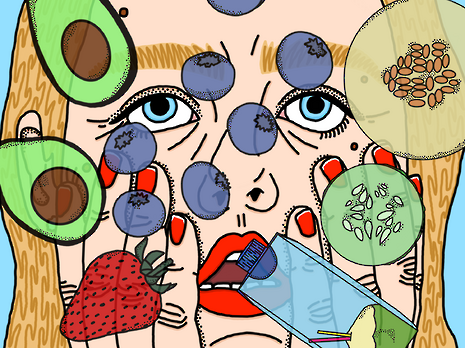University culture must recognise the dangers of obsessively ‘clean eating’
Obsessively ‘healthy’ eating should be recognised as the danger that it is, argues Millie Morgan

Content Note: This article contains detailed discussion of eating disorders and body image, and mention of suicide.
Orthorexic tendencies (symptoms of obsessive behaviour in pursuit of a healthy diet) – and the bingeing-purging patterns that inevitably follow – are silently becoming a more common part of student life. Eating habits and thinking patterns that can pave the way for a disorder are too frequently swept under the rug, normalised and sometimes even glorified.
Particularly in the perfectionist culture of Cambridge student life, ‘clean eating’ is praised as an indication that you’ve got your life together. But the focus of ‘health’ and ‘wellbeing’ is often a disguise for the true motivation of overly-controlled eating, often a much deeper underlying struggle with food and body image.
With so many young, competitively-minded students – and ample opportunity to compare their bodies with other people – unhealthy relationships with body image are amplified, and this can translate into a fear of any food that might prevent them from looking as slim as their peers. Some people begin to restrict their eating in the name of ‘health’ and ‘wellbeing.’
My personal experience with ‘clean eating’ choices were guided by a fear of calories that could not be unlearned, especially with the masses of calorie swaps and hacks cluttering my Instagram explore section. Away from the influence and control of my parents’ eating at home, university gave me the freedom to restrict as I pleased, all the while hiding my insecurities behind a ‘healthy’ lifestyle.
Superficially ‘healthy’ eating is often praised and considered an example of how ‘together’ someone’s life is, especially if maintained alongside the pressures of a Cambridge workload. With such gratification combined with the intensely competitive nature of many Cambridge students, it isn’t surprising to see my overly-controlled eating behaviours reflected in my peers.
Orthorexic tendencies often go unnoticed because people don’t acknowledge them as problematic. In reality, orthorexia can be extremely damaging to long term mental health and relationships with food, and orthorexia is estimated to affect 7% of the general population.
We need to speak more kindly about the food we put into our bodies
However, because orthorexia is not classified as an official eating disorder, it frequently goes undiagnosed and untreated as sufferers are unaware that their behaviours are unhealthy. At universities, this behaviour creates an echo chamber which normalises the assignment of moral weight to food based on its calorie density. The ‘health’ promised by certain Instagram accounts with their low-calorie ‘hacks’ only exacerbates this.
The consequences of restrictive eating in a university environment are severely damaging for mental wellbeing. Orthorexic tendencies often lead to uncontrollable bingeing when ‘bad’ foods (which sufferers endeavour to keep out of their cupboards) become accessible. At university, these situations are not infrequent. At formals or special dinners, we’re encouraged to eat and drink to no end (alcohol consumption itself being difficult to navigate for people who have internalised the wasted calorific value), and social events are often accompanied by a pile of Sainsbury’s snacks. Bingeing is not a question of lack of willpower: it results from restricting one’s body from what it intuitively requires, and assigning guilt towards large quantities of restricted food.
Obsessing over food and feeling guilty about eating the ‘wrong’ things is not natural, yet I often hear my peers say they ‘shouldn’t’ eat certain calorific things, as if this is a normal and healthy attitude towards food.
Orthorexia should be recognised and taken seriously as an eating disorder. It can cause years of mental health issues and body-dysmorphic symptoms which result from the restrict-binge cycle. It can give way to disorders that have significant implications for physical health.
One in twenty young women has an eating disorder. One in five practices unhealthy dieting, purging and binge-eating patterns. These figures are rising. Anorexia nervosa has the leading mortality rate of all psychiatric diseases. An anorexic is three times more likely to die by suicide than someone with depression.
We need to speak more kindly about the food we put into our bodies. We need to challenge the use of language which assigns moral weight or guilt to food. We have to second guess the ‘weight-loss hacks’ we see on Instagram and listen to reliable science-based nutrition. We have to acknowledge that restrictive eating is not natural and teach ourselves to enjoy a genuinely healthy relationship with food.
 News / Hundreds of Cambridge academics demand vote on fate of vet course20 February 2026
News / Hundreds of Cambridge academics demand vote on fate of vet course20 February 2026 News / Judge Business School advisor resigns over Epstein and Andrew links18 February 2026
News / Judge Business School advisor resigns over Epstein and Andrew links18 February 2026 News / University Council rescinds University Centre membership20 February 2026
News / University Council rescinds University Centre membership20 February 2026 News / Petition demands University reverse decision on vegan menu20 February 2026
News / Petition demands University reverse decision on vegan menu20 February 2026 News / Caius students fail to pass Pride flag proposal20 February 2026
News / Caius students fail to pass Pride flag proposal20 February 2026










